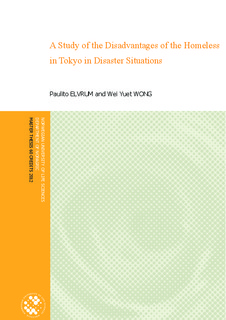| dc.description.abstract | Homelessness holds a number of challenges associated with vulnerability such as isolation, lack of access and lack of resources. This paper looks into the disaster vulnerability of the homeless in Tokyo, and discusses ways in which the homeless are particularly vulnerable and disadvantaged in the wake of a disaster. At present, the homeless are still not included in disaster mitigation plans. We therefore argue that efforts should be made to include the homeless in disaster mitigation plans and preparation policies in the near future. The study uses information gathered from established secondary literature in addition to interview data from our fieldwork in Japan. The interviews include various respondents from
non-governmental organizations (NGOs), community based organizations (CBOs), social workers, and local government officials among others. Furthermore, to complement our interview data, we conducted a survey that gathered data from seventy-three university students in Tokyo, about their personal and perceived attitude towards homeless people in Japan. As a result of completing the above procedures, we found that: 1. Public services and disaster mitigation policies still exclude the homeless from having specific routines and measures to help them in such circumstances. 2. The lack of economical assets and capacity prevents the homeless from meeting the recommended and expected requirements for individual responsibilities to prepare for disaster emergencies. 3. Social stigmatization further excludes the homeless from "mainstream" communities; assets that can be helpful during disaster situations.
There is a need to recognize the necessity to include the homeless in disaster mitigation policies and routines. Further investigation and efforts should be made on how to strengthen the capacities of the homeless both in everyday life and in disaster situations. | no_NO |
